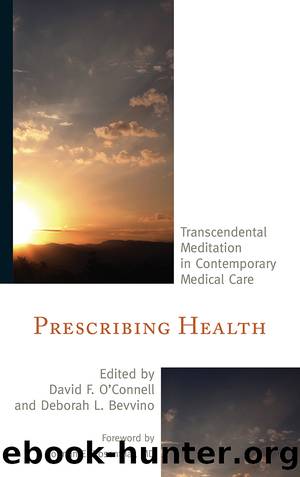Prescribing Health by unknow

Author:unknow
Language: eng
Format: epub
Publisher: Rowman & Littlefield Unlimited Model
Published: 2015-08-15T00:00:00+00:00
Eight
The Use of Transcendental Meditation Practice in Promoting Recovery and Preventing Relapse for Addictive Diseases
David F. OâConnell, Ph.D., M.S., CFC, DABPS, and Alarik Arenander, Ph.D.
This chapter focuses on the practice of Transcendental Meditation (TM®) to treat addictions. A review of the major studies on TM and addiction is included. The psychological, physiological, neuropsychological, and social changes imparted by TM are considered, and a presentation of the putative mechanisms of action that underlie TM is given. Guidelines for the use of TM in clinical practice are considered, along with the implications of TM and addiction research results for the management and treatment of addictive diseases.
Alcoholism, other chemical dependencies, and behavioral addictions (e.g., sex, shopping, smoking, gambling, working, eating) continue to present a formidable clinical challenge to healthcare professionals. Recent research indicates that an estimated 22.5 million Americans (8.7 percent of the American population) age twelve and older use illicit drugs. Nearly 15 million Americans age twelve and older report binge drinking and heavy alcohol consumption,1 and the annual cost of the impact of drug and alcohol abuse is $600 billion.2
Rates of drug and alcohol abuse or dependence in the general population, rates of relapse to active addiction, and the number of individuals receiving treatment for an addiction have remained essentially unchanged or have increased over the past decade, despite the development of an ever-growing array of prevention and treatment programs and clinical approaches for these disorders.3 Up to 20 percent of patients seeking primary medical care have a chemical dependency disorder,4 and nearly 50 percent presenting for psychiatric care have a comorbid addictions disorder.5,6 This continued clinical challenge is no doubt related to the complexity and intractability of the addictive process and the multidimensional nature of its causes, as well as its psychological, physical, social, and spiritual signs, symptoms, behaviors, and disparate clinical expressions.6
Among the varied clinical approaches devised and tested to treat addictions, the practice of TM has emergedâbased on research and clinical experienceâas a very effective and, in some cases, superior program to arrest this often chronic illness and to promote continuous recovery maintenance.
Research on TM and Addiction Treatment
A recent statistical meta-analysis7 published in the Harvard Review of Psychiatry on several meditation techniques used to treat addiction and other psychiatric disorders indicates that meditation techniques, including TM, can have a significant impact on the course and treatment of addictive diseases. The authors of the study hypothesize that the following bring about the positive effects of meditation.
Meditation may attenuate compulsive and fixed drug-taking behaviors.
Meditation results in an improved ability to attend to and monitor thoughts and feeling states (self-awareness).
Mediation results in greater self-regulation of moods, impulses, and behaviors.
Download
This site does not store any files on its server. We only index and link to content provided by other sites. Please contact the content providers to delete copyright contents if any and email us, we'll remove relevant links or contents immediately.
Clinical Ophthalmology - 2019 by Weber MD C. G(150)
Transitions to Adulthood for Youth With Disabilities Through an Occupational Therapy Lens by Debra Stewart(129)
Textbook of Radiology And Imaging, Vol 2 - E-Book by Bharat Aggarwal(122)
The Glaucoma Guidebook by Constance Okeke(117)
Around the Eye in 365 Days by Gary Schwartz(114)
Emerging Threats of Synthetic Biology and Biotechnology: Addressing Security and Resilience Issues by Benjamin D. Trump; Marie-Valentine Florin; Edward Perkins; Igor Linkov(114)
Careers in Pathology by Institute For Career Research(109)
The End of Physiotherapy by David A. Nicholls(108)
Manipulative Therapy: Musculoskeletal Medicine by Karel Lewit (Author)(104)
EMT - Emergency Medical Technician by Kolmetz Melodie;(102)
Prescribing Health by unknow(100)
PANCE (Physician Assistant Nat. Cert Exam) Flashcard Book by Rapp Doris;(96)
The Role of Telehealth in an Evolving Health Care Environment by Tracy A. Lustig(94)
Diverse Roles for Occupational Therapists by Clewes Jane;Kirkwood Rob;(94)
Strategies for Collaborating with Children : Creating Partnerships in Occupational Therapy and Research by Clare Curtin(94)
Bringing Evidence into Everyday Practice: Practical Strategies for Healthcare Professionals by Winnie Dunn(93)
Reflexology by Seber Isaiah(91)
Premium and Specialized Intraocular Lenses by Guy Kleinmann; David J. Apple; Ehud I. Assia(86)
Your Healthcare Job Hunt: How Your Digital Presence Can Make or Break Your Career by Malvey Donna;Sapp Jessica; & Jessica Sapp(83)
